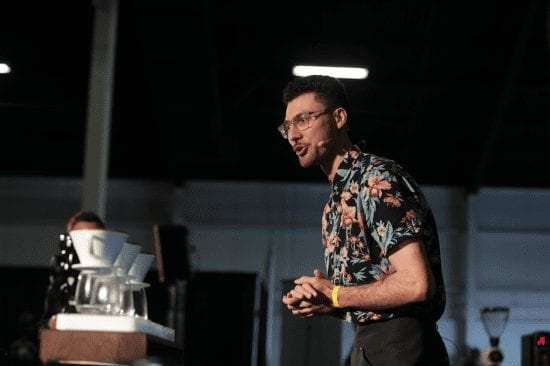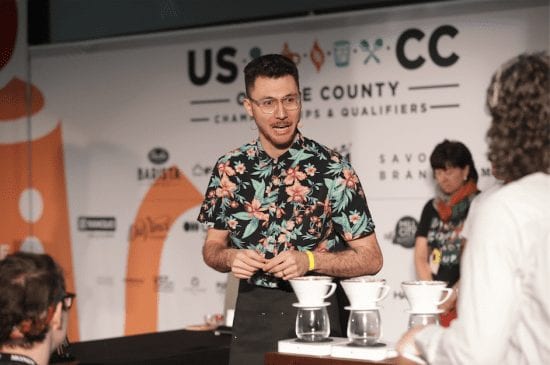
A barista trainer at Onyx Coffee Lab, Elika combined his vision of sustainability and innovation with elements of his heritage to win the 2020 U.S. Brewers Cup.
BY CHRIS RYAN
BARISTA MAGAZINE ONLINE
Cover photo by The Pour courtesy of Pacific Foods.
Last month in Costa Mesa, Calif., making his first appearance in the U.S. Brewers Cup finals, Elika Liftee discussed the ideas of discipline and innovation. He wanted to honor the forward-thinking tactics that farms like La Palma y El Tucan (whose coffee he was using) employ to produce amazing-quality coffee, but he also wanted to make a little of that coffee go a long way, demonstrating that sustainability-minded efforts can still produce awards-caliber results.

Elika did just that in Costa Mesa, using a quick-extraction method of 10g doses on a Kalita Wave to capture the 2020 U.S. Brewers Cup title. The La Palma y El Tucan Gesha he used in the routine also allowed him to present an element of himself, with his Hawaiian roots reflected in the coffee’s tropical flavors.
Elika, an assistant barista trainer at Arkansas’ Onyx Coffee Lab, will now take his routine to the World Brewers Cup stage in Melbourne, Australia, in November. He’ll travel Down Under with his Onyx colleague Andrea Allen, who won the U.S. Barista Championship on the same day as Elika’s victory. We talked to Elika about his competition routine, preparing for the stage, and much more.
Chris Ryan: Can you describe your coffee background? How long have you been in coffee, how did you come to work in it, and what are some of your duties at Onyx?
Elika Liftee: Like many people, I got interested in coffee while in college. I attended John Brown University in Siloam Springs, Ark., and made my first visit to Onyx Coffee Lab in 2012. I tried a black coffee on pourover and was amazed that they didn’t add any flavoring to the cup. That got me hooked. I applied to work there during school and unfortunately didn’t make it past the interview.
A few years later I was looking to move back to the area and Onyx hired me for their new café. So, for four and a half years I’ve worked for Onyx in some capacity—first as a barista, then as the director of events, a manager, and for the past three years I’ve been the assistant trainer. Dylan Siemens (head of education) and I split barista training in our cafés. We train a lot of our wholesale partners in our lab or on-site at their locations. We handle quality control of the coffees in our shops, as well. I’m also responsible for writing the brewing recipes that we put up on our website for each coffee.

How many years have you competed? What do you like about Brewers Cup as a coffee competition?
This was my third year competing in the Brewers Cup. I made an attempt at Cup Tasters a while back, but to little success. I always wanted to compete in Brewers. I’m a pretty competitive person and made coffee at home for a while before working for Onyx. Brewers Cup seems both elevated and approachable. People have been doing some wild things onstage, but you could probably replicate most recipes at home or at the café. I think it can be engaging for audiences in that way. Also, I just like drip coffee more than I like espresso.
How did you settle on the “discipline and innovation” theme of your routine?
My theme didn’t solidify until a couple weeks before Nashville qualifiers. I wanted to bring a weightier message to the Brewers stage, like we see in Barista, but I wanted to relate it to the entire performance. I was inspired by La Palma’s example of sustainability. They are known for producing excellent quality and experimental processing, but their discipline stood out to me. Similarly, Onyx’s motto of “Never Settle for Good Enough” can sometimes be taken out of context. We aren’t reckless.
My theme of discipline and innovation was important to me because it represents not only my own approach, but also how I think our industry will truly thrive. Innovation is important because it’s how we raise the ceiling. This pushes farmers to produce better cup quality and baristas to serve better drinks. Discipline is just as important to make sure we don’t drop the floor out from underneath ourselves. The specialty industry is expected to increase 43% in the next five years, yet in the next 25 years we are expected to lose 50% of current coffee-growing lands due to climate change. I wanted to do a small part by showing that I could make a small dose of coffee taste great. Turned out I could also extract that coffee more efficiently and quickly than our normal recipes—10g of coffee extracted to 23% in under 2 minutes. La Palma fit perfectly into that theme because that’s what they do. If you look at their recent Instagram posts, you can see how they removed large amounts of their profitable Estates & Varietals trees to reintroduce native plants. Their effort to improve their own sustainability hasn’t sacrificed cup quality, and I was happy to showcase their efforts.

You mentioned in your routine that many of the notes of tropical fruits in your coffee were reminiscent of your Hawaiian upbringing. Was it important to you to represent that part of yourself with your coffee, or did that end up being a happy accident?
Yes! My parents were in the Air Force. My Mom was from Oklahoma and my Dad was Native Hawaiian, but I was actually born in Japan. I didn’t actually grow up in Hawaii where my dad is from; instead I grew up in Oklahoma around my mom’s family. So, not only do I not look very Hawaiian, but also I didn’t grow up with a lot of the traditional culture, I grew up like an Okie. One of the things that I feel very connected with, though, is food. Growing up, my dad had lots of tropical fruit nectars in the fridge, he taught me how to core pineapple, eat papaya, guava, as well as Hawaiian staples like Spam and eggs! I love Oklahoma, fishing, and football, but growing up I felt like an outsider. I love tropical coffees, and La Palma’s Gesha almost fell right into my lap. I wanted tropical, I wanted floral, and I wanted lots of sweetness. I can’t say I would have been as willing to serve a Spam coffee, but I’m open to the collaboration.
What was your experience like of competing in the finals?
Oh my goodness, that was exciting and nerve-racking. There were so many great competitors this season. It was my first finals, but I’d learned a lot from my judges the past two years. Still, until I heard my name, it wasn’t real. My routine hadn’t changed much from Nashville, so I was familiar and comfortable with it. Onyx’s team is supportive and I never had to worry about the little things. At that point it’s all up to your preparation, and I worked really hard this season to be up there. I worked hard on the recipe and poured water over and over, I worked hard tasting that coffee, I worked hard watching Dakota roast my coffee (thanks Dakota), I worked hard on my script and movements onstage (thanks Dylan). Honestly, I was more nervous for Andrea in finals because for a long time I’ve believed she’s the best. I just wanted to do my best and I believed I’d put in the work to be successful.

What did it mean to you to win this competition, and to represent Onyx?
It means a lot. I don’t express myself very openly, but it was an emotional experience. As someone who has traditionally worked behind the scenes in different roles, it’s great to see my ideas resonate and succeed. I wanted to win for Onyx and Northwest Arkansas. Our specialty-coffee community is small and the market is nowhere near saturated. I want our community to recognize that some of the best coffee in the world is served in their neighborhood and I’m proud that Onyx is a big part of that. It’s exciting to me that Northwest Arkansas, and Onyx, has become a coffee tourism destination.

